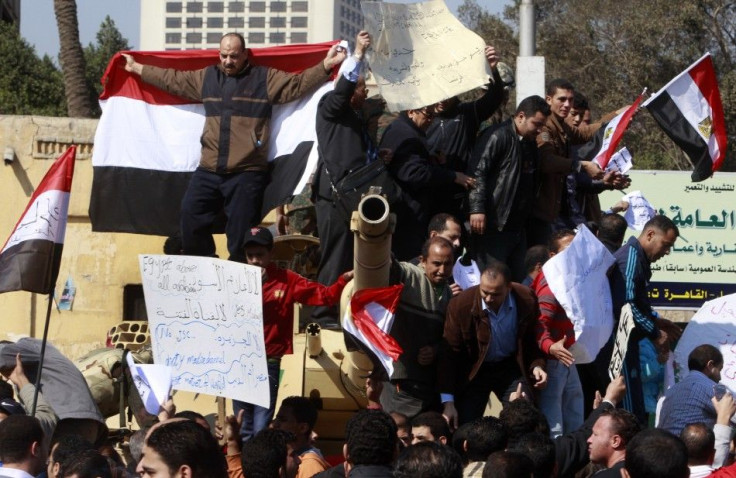Egyptians seek to forge democracy from revolution

Egyptian youth leaders moved to set up a new political party on Thursday in the post-Mubarak era while a committee worked on changing the constitution to prepare for elections promised by military rulers within six months.
The Higher Military Council that took over after the overthrow of Hosni Mubarak, 82, was under pressure on Thursday from activists demanding the immediate release of political prisoners and the lifting of emergency rule.
Pro-democracy leaders plan to bring one million people out on the streets for a Victory March on Friday to celebrate his ouster, and perhaps remind generals of the power of the street. The military was setting a strategy on Thursday for policing it.
Life in Egypt is still far from normal six days after the momentous overthrow of Mubarak, 82, with tanks on the streets of Cairo, banks closed, worker protests and demonstrations given voice by revolutionary fervour and schools shut down.
We are in a test that we have yet to come out of. Are you pleased by the strikes, sit-ins, the closed factories, the banks that are not working? army spokesman General Ismail Etmaan said on state television late on Wednesday night.
The Higher Military Council will put matters back on track, but help us, he said. The armed forces do not have future ambitions and want to hand power to the civilian parties when they are strong so that they don't collapse.
ONE LESS HEADACHE
The cancellation of plans by two Iranian naval vessels to pass through the strategic Suez Canal removed on Thursday a potential foreign policy headache for the military.
Its top priorities after suspending the constitution are restoring law and order and reviving the economy, which was damaged by the 18-day revolution, but the issue of the Iranian warships had threatened to become a distraction.
Israel's foreign minister had called the proposed passage a provocation, and its go-ahead could have put Egypt, a key ally of the United States which has a peace treaty with Israel, in an awkward diplomatic position.
An ailing Mubarak, holed up with his family in the Red Sea resort of Sharm el-Sheikh, is still coming to terms with the tumultuous events that unseated him and is apparently shunning exile and vowing to live and die on Egyptian soil.
The momentous revolt that ended 30 years of iron rule by Mubarak has sent shock waves around the Middle East. Bahraini police stormed a protest camp in the capital Manama early on Thursday, killing at least three people, and there has been trouble on the streets of Iran, Libya, Iraq and Yemen.
The upheaval in Egypt has caused concern in Israel and Washington, suspicious of the rise of the Islamist Muslim Brotherhood, a mass organisation that is sure to play a key role in the future of modern Egypt.
A committee, which includes a member of the Brotherhood, Sobhi Saleh, as well as legal and constitutional experts, was meeting on Thursday as the military dismantles the mechanism that kept Mubarak's autocratic rule in place.
Saleh said on Wednesday the military council had pledged to lift emergency laws before parliamentary and presidential elections are held. It was not immediately possible to confirm whether the council had given such a guarantee.
Some secular leaders fear that racing towards elections in a nation where Mubarak suppressed most opposition activity may hand an edge to the Brotherhood, banned under Mubarak.
The military council has already dissolved parliament and suspended the constitution and now the committee must hammer out new amendments, likely to shorten presidential terms and ensure fair election rules, that must be ready in 10 days.
As part of a transition to democracy and civilian rule, the nation will vote in a referendum on the amendments prior to parliamentary and presidential elections within six months.
CHILDREN OF THE REVOLUTION
Uncertainty remains over how much influence the military will seek to exert in reshaping a corrupt and oppressive ruling system which it has propped up for six decades.
Members of the new pro-democracy Council of Trustees of the Revolution appeared at a news conference in downtown Cairo on Wednesday night to say its goal was to unite ranks, protect the revolution and open a dialogue with the military.
Existing registered parties are mostly small, weak and fragmented. The Muslim Brotherhood, which under the now suspended constitution could not form a party, may be the best organised group, but its true popularity has yet to be tested.
With no clear leaders, the youth movement that was pivotal to the revolution due to its use of social networking sites to organise protests is seeking to overcome splits and expects to announce a timetable for a new political party on Thursday.
The U.S. Treasury on Wednesday told American banks to closely monitor transactions related to ousted Egyptian officials for any signs state assets were being misappropriated.
© Copyright Thomson Reuters 2024. All rights reserved.











